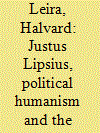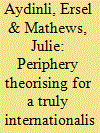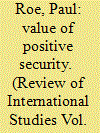|
|
|
Sort Order |
|
|
|
Items / Page
|
|
|
|
|
|
|
| Srl | Item |
| 1 |
ID:
088347


|
|
|
|
|
| Publication |
2009.
|
| Summary/Abstract |
Justus Lipsius (1547-1606) was among the most influential thinkers of the late 16th/early 17th centuries. His guides for action were highly influential in the establishment of moderate absolutism and what has been called the fiscal-military state across Europe. In this article I explore Lipsian thought in an International Relations context. Special attention is paid to his ideals of discipline, which were meant to order both the ruler and those that he ruled. Dignity, self-restraint and discipline were the recipes for the foreign policy of the prince, while the individual was subordinated to the purposes of the state, and taught to control his own life by mastering his emotions. If not a seminal thinker in his own right, it is necessary to understand Lipsius' thought and influence to be able to fully understand the 17th century theoretical approaches to peace and prosperity and the relative discipline of early-modern statecraft.
|
|
|
|
|
|
|
|
|
|
|
|
|
|
|
|
| 2 |
ID:
088345


|
|
|
|
|
| Publication |
2009.
|
| Summary/Abstract |
By remaining epistemologically committed to an outdated distinction between facts and values, traditional definitions of legitimacy either divest the concept of an important critical component or fail to properly anchor it in the social reality. As an alternative, the article proposes a constitutive theory of legitimacy that reconciles the epistemological tension via the concepts of fairness and tractability and bridges the theoretical gap via the concept of deliberative legitimacy. By applying it to the issue of the use of force, the article argues that a normatively sound and politically relevant model of legitimacy must take into account both to the manner in which actors' commitment to social norms is crafted and the type of conditions that facilitate or constrain the definition, contestation, and adjudication of what counts as legitimacy in a particular political context.
|
|
|
|
|
|
|
|
|
|
|
|
|
|
|
|
| 3 |
ID:
088350


|
|
|
|
|
| Publication |
2009.
|
| Summary/Abstract |
In October 2005, UNESCO's General Conference adopted the Convention on the Protection of the Diversity of Cultural Contents and Artistic Expressions. The intense debates around the Convention, the defeat of the US position, and the compromises reached illustrate the shifting nature of global politics and the importance of the 'culture question' in global governance, but also confirm a hierarchy in the mandates of intergovernmental organisations. In this article we describe the making of this particular international convention, what we define as the 'liberal' versus the 'culturalist' positions among UNESCO's member-state delegations, and the relevance of world polity and world-systems theories with respect to the international order. The article draws on our observations, a close reading of relevant UNESCO documents, and interviews with UNESCO officials and delegates.
|
|
|
|
|
|
|
|
|
|
|
|
|
|
|
|
| 4 |
ID:
088348


|
|
|
|
|
| Publication |
2009.
|
| Summary/Abstract |
Concerns over inequalities that have been located between the roles of the core and periphery within the development of the IR discipline have led to questions of whether it is possible to build up theoretical concepts in IR based on national differences. There have not yet been studies however providing an in-depth look at how IR theorising has been developing within a periphery country or region, and exploring both the local and core level factors inhibiting the development of original theoretical paradigms from within that context. By looking at the Turkish experience, the article postulates that homegrown theorising may be the only means for periphery IR to be respectfully acknowledged by the core IR discipline.
|
|
|
|
|
|
|
|
|
|
|
|
|
|
|
|
| 5 |
ID:
088349


|
|
|
|
|
| Publication |
2009.
|
| Summary/Abstract |
A large proportion of humankind today lives in avoidable poverty. This article examines whether affluent individuals and governments have moral duties to change this situation. It is maintained that an alternative to the familiar accounts of transdomestic distributive justice and personal ethics put forward by writers such as Peter Singer, John Rawls, and Thomas Pogge is required, since each of these accounts fails to reflect the full range of relevant considerations. A better account would give some weight to overall utility, the condition of the worst off, and individual responsibility. This approach provides robust support to global poverty alleviation.
|
|
|
|
|
|
|
|
|
|
|
|
|
|
|
|
| 6 |
ID:
088344


|
|
|
|
|
| Publication |
2009.
|
| Summary/Abstract |
Recent years have seen a growing interest in questions about justice after war (jus post bellum), fuelled in large part by moral questions about coalition operations in Afghanistan and Iraq. As a result, it has become common to argue that jus post bellum is a third strand of Just War thinking. This article evaluates this position. It argues that that there are broadly two ways of understanding moral requirements after war: a minimalist position which holds that moral principles derived largely from jus ad bellum and jus in bello concerns should constrain what victors are entitled to do after war and a maximalist position which holds that victors acquire additional responsibilities that are grounded more in liberalism and international law than in Just War thinking. Finding problems with both approaches, the article argues that it is premature to include jus post bellum as a third element of Just War thinking and concludes by setting out six principles to guide future thinking in this area.
|
|
|
|
|
|
|
|
|
|
|
|
|
|
|
|
| 7 |
ID:
088343


|
|
|
|
|
| Publication |
2009.
|
| Summary/Abstract |
This article contributes to current debates about Just War by analysing an insufficiently recognised problem with the way Just War theorists have responded to the two principal challenges surrounding the ethics of violence in international relations since the end of the Cold War - humanitarian intervention and the 'global war on terror'. The problem focuses on strongly embedded assumptions that exist in contemporary Just War debates about the nature and meaning of territory. The article argues that Just War needs to engage more systematically with challenges to dominant 'Westphalian' framings of territory, space and scale in order to contribute more effectively to important ethical debates about the use of violence in international relations.
|
|
|
|
|
|
|
|
|
|
|
|
|
|
|
|
| 8 |
ID:
088351


|
|
|
|
|
| Publication |
2009.
|
| Summary/Abstract |
Programs to deploy weapons in orbital space have important implications for international relations. In this paper, we analyze the constitutive logic of three modes of space weaponization currently being pursued by the United States - space-based missile defense, space control, and force application from orbital space. We show that these technologies of killing, when bundled together, constitute a new form of centralized sovereign power in a context of de-territorialized sovereignty. This is a new type of international political society, which we call empire of the future, distinct from and more ominous than the de-centralized form of Empire theorized by Hardt and Negri and the modern expression of classical hegemony now widely debated in discussions of putative American empire.
|
|
|
|
|
|
|
|
|
|
|
|
|
|
|
|
| 9 |
ID:
088346


|
|
|
|
|
| Publication |
2009.
|
| Summary/Abstract |
Near the end of his career, Raymond Aron explained that he had never ceased to 'think or dream or hope - in the light of the idea of Reason - for a humanized society', a hope that extended to the conduct of international affairs as well. The purpose of this essay is to examine how Aron's liberalism manifested itself in his theorising about international relations and in some of his less abstract diplomatic recommendations. In tracing the effects of Aron's fundamental theoretical commitments on his more concrete policy analyses, we examine how Aron's liberalism affected his approach to two of the most contentious issues in French foreign policy, namely, the decolonisation of Algeria and the creation of the force de frappe, France's nuclear weapons programme. We argue that the tensions and contradictions in Aron's foreign policy prescriptions have their origins in his ambivalence over the source and character of human reason.
|
|
|
|
|
|
|
|
|
|
|
|
|
|
|
|
| 10 |
ID:
088352


|
|
|
|
|
| Publication |
2008.
|
| Summary/Abstract |
This article seeks to revise the concept of Positive Security. Although largely neglected by the existing Security Studies literature, Bill McSweeney's work otherwise represents a significant contribution in this regard. The author argues, however, that although of great value, McSweeney's positive security formulation is unduly restrictive in terms of the referent object and to the sectors of security it is applicable to, and cannot unproblematically be equated to ontological security, as McSweeney's work tends to do. Employing Graham Smith's notion of a 'generic' security conception, and placing positive security more firmly in the peace studies tradition, the author suggests rather that a revised concept be predicated on the defence of 'just' values.
|
|
|
|
|
|
|
|
|
|
|
|
|
|
|
|
|
|
|
|
|